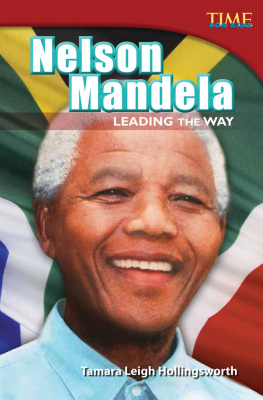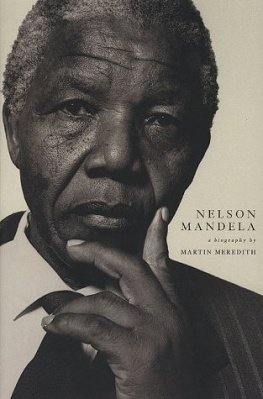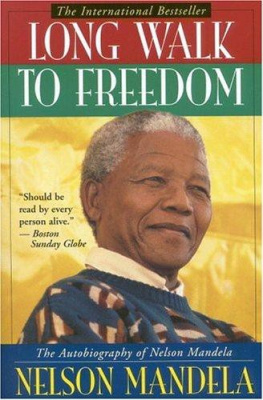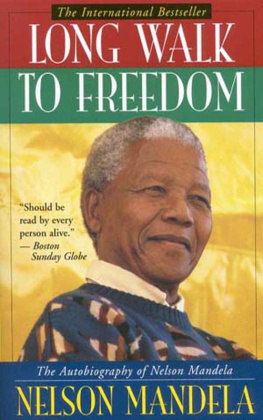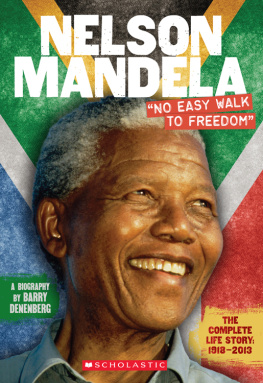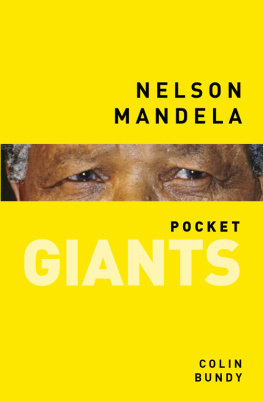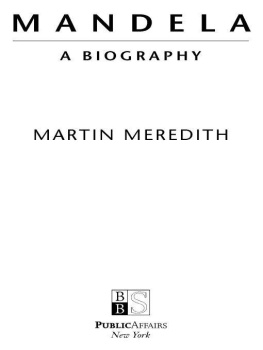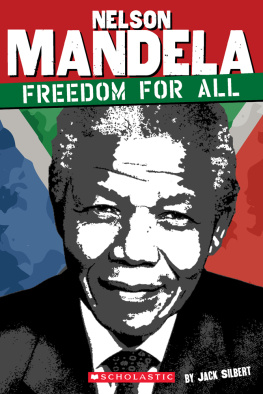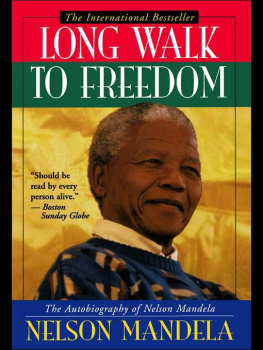Nelson Mandela Biography The Long Walk to Freedom
Chris Dicker
Published By Chris Dicker AtSmashwords
Copyright 2016-2017 ChrisDicker
This publication is gearedtowards providing exact and reliable information in regards to thetopic and issue covered. The publisher is not required to renderaccounting, officially permitted, or otherwise, qualifiedservices.
Its prohibited toreproduce, duplicate, or transmit any part of this publication ineither electronic means or printed format. Recoding of thispublication is strictly prohibited and any storage of this documentis not allowed unless with written permission from the publisher.All rights are reserved!
The information providedherein is stated to be truthful and consistent, in that anyliability, in terms of inattention or otherwise, by any usage orabuse of any policies, processes, or directions contained within isthe solidary and utter responsibility of the recipient reader.Under no circumstances will any legal responsibility or blame beheld against the publisher for any reparation, damages, or monetaryloss due to the information herein, either directly orindirectly.
The information herein isoffered for informational purposes solely, and is universal as so.The trademarks that are used are without any consent, and thepublication of the trademark is without permission or backing bythe trademark owner. All trademarks and brands within this digitalbook are for clarifying purposes only and are owned by the ownersthemselves, not affiliated in this document.
The Image Cover of ThisBook is Provided By:
South Africa The Good News / www.sagoodnews.co.za[ CCBY 2.0 ]
Table ofContents
Intro
Nelson Mandela themuch-celebrated Pan Africanist and freedom fighter in the20 th century remain amongst the most famous leaders in the Africancontinent today. His relentless determination to liberate his blackcountrymen from the yokes of racial oppression after 27 yearsbehind bars in apartheid prisons and to become president of the newrainbow flagged Republic of South Africa is now a legendary act inthe eyes of many Africans and across the globe.
Integrally noticeable is hissuccessful reconciliation and quelling of serially insurmountableconflict seen by many political analysts as elusively unstoppableby then. In this regard, Mandela was able to entrench unity as apolitical virtue in South Africa by bringing together bitter foesin a delicate span of transition from the apartheid to Democraticrule as the first black African president from 1994 to1999.
Further, Mandela exuded anact of shrewdness and selflessness in inherently subduing hisbitterness remorsefully following his extended period ofimprisonment under the brutalities of the Apartheid system. Hededicated himself as an act of patience to listen impartially toall sides of the political divides to strike an amicable end to theconflicts.
However, one would askintuitively as to how he was able to make such significantachievements and within which framework of logic and why. Could itbe the work of his Madiba magic? Besides, how did these resultsaffect his personal life and that of his family? What motivated himand in essence is his legacy after such legendaryachievements?
In order to delve deep intothe answering the above questions, then one should unreservedlyappreciate the great African culture. Contextually, this informedsome of the wise resolutions Mandela made, the social status of thefamily, his friends, schooling and the consequential effect of theApartheid rule informed by the unchallengeable imperial interestsof white settlers in South Africa.
Family andChildhood
Nelson Mandela Madiba wasborn on July 18, 1918, in Transkei, South Africa. Mandela's fatherhad four wives and Mandela's mother, Nosekeni Fanny, was the third.His father died when he was nine years old after which ahigh-ranking chief educated him for to become a CivilServant.
The early family life andchildhood of Nelson Mandela helped shape his personality and theviews that would later play out in his life. Mandelas actualbirthplace was the small South African rural village of Mvezo inthe district of Qunu. Despite the fact that the house in which hewas born is no longer existing, this beautiful village still existstoday, not very distant from the town of Umtata (Mthatha) in theregion known as the Transkei (literally meaning across the KeiRiver). The Mandela homestead had a direct view of the Mbashe(Bashee) River.
This is the mainland of theThembu people, an important section of the Xhosa nation. Here iswhere Rolihlahla Madiba Dalibhunga Mandela, later known in theworld over as Nelson Mandela, was born.
In the surrounding pastoralenvironment, Mandela learned and cherished from his family and clanabout his peoples culture and traditions. Later, he would attendthe English language lessons in European-style schools, but as achild, he fully absorbed Xhosa culture, initiation customs, ideasof leadership, and language and the act of humanness or Ubuntu(translated as a feeling of fellowship and compassion in Africansociety).
Mandelas initially givenname, Rolihlahla, is literary translated directly as troublemaker.His clan name, Madiba, which also mean 'to reconcile' would remaina praise name and an affectionate word used by friends andcompatriots in years to come.
Featuring prominently inmost African cultures is the idea of extended family structures,where children of aunts and uncles considered as brothers andsisters, not just cousins. Mandelas extended family was noexception.
His sister Mabel NotancuNtimakhwe back in the 1980s and 1990s, recalled Rolihlahla as abold and serious young boy even then, with strong leadershipqualities, and who was known to be bright. Leabie, another youngersister, recollects that at the time his sisters called himButi.
Mandela was committed torespecting the Elders of the Xhosa community as was required in theAfrican culture. By extension, this meant that he had to becommitted to the greater social well-being and deference. This isreflected later in Mandela's adult life despite his high socialstatus as a member of the Xhosa society.
Mandelas father, HenryGadla Mphakanyiswa (1880-1927) was chief councilor to the paramountking of the Thembu people. Xhosa aristocracy comprised of threeHouses; the Right Hand House, a Great House from whichauthorities are traced, and a minor or Left Hand House.Mandela wasmaternally born into the Right Hand House and therefore closelypart of the royal family of Xhosa, although his descent-line wasnot that of the ruler.
Besides, he was only theyoungest of four sons. However, Henry, as chief advisor to theking, took part in decision making, especially in a 1924 disputeover royal succession that was to have a significant bearing onNelson Mandelas life. Henry was headman of Mvezo village, whochaired community meetings and local ceremonies. He also served onthe advisory council (Bhunga) which was overseen by the whitegovernment. As a result of this social significance, Rolihlahlasfather was a custodian of Thembu and Xhosa history, and he told hissons many stirring narratives of African history. Mandela alsoinherited his fathers tall and proud bearing.
His mother, NonqaphiNosekeni Fanny, was the third of his fathers fourwives.
Given that it was atradition deeply rooted in the Xhosa community, their men wouldtake more than one wife in depending on their prosperity; a factalso indicated by the number of cattle in one's possession becausecattle was considered the most important form of wealth, used forbride wealth, or payment of dowry, upon marriage.
Nosekeni had an importantdefinitive influence on her son. Mandela later pointed that hismother was his first real friend. She narrated to him Xhosa moraltales and great legends. After converting to be a Christian andtaking the name Fanny, she took it upon herself to that her sonwas baptized at the Methodist (Wesleyan) Church.Mandela had threesisters, Notancu (Mabel), Baliwe and Makhutswana. Moreover, hisfather also had 3 sons and 6 daughters by other wives. As a youngboy, Mandela merrily played with them traditional games and sports,such as stick-fighting, riding animals, and making toys.
Next page


